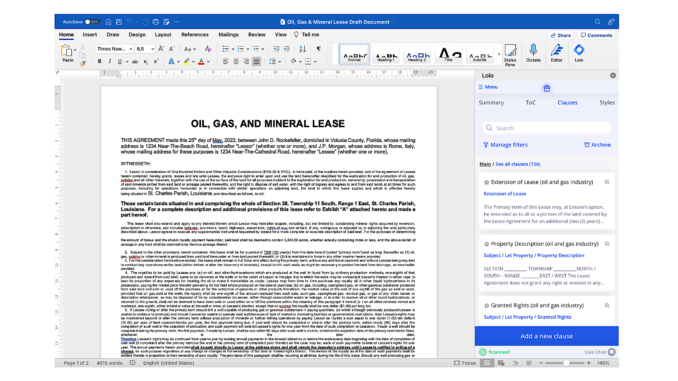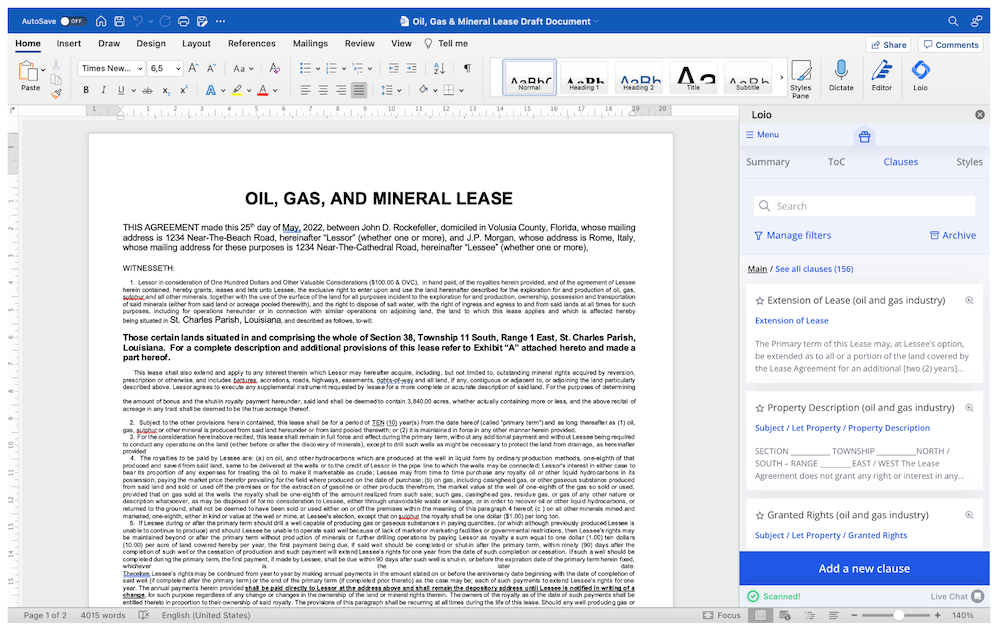
By Inna Ptitsyna, Product Communications Manager at Loio, a product of Lawrina.
Imagine a world where contract drafting is no longer a necessary and time-consuming challenge that you must deal with daily. With AI-powered drafting software, you can avoid making potential errors in clauses, money amounts and dates when creating legal agreements. AI document-writing software can change the way you approach contract drafting and negotiation.
Also, lawyers are not the only professionals working closely with contracts and drafting. In this article, you’ll learn how landmen work with contracts and why legal tech is helpful there. You’ll also find out how AI algorithms can be tailored to any industry and why this technology enables various contract professionals to achieve their goals more efficiently.
Landmen, Contracts, and Legal Tech
A land manager, or landman, is a member of the energy source exploration and production team who negotiates leases with landowners in order to conduct oil, gas, mineral, or other energy source exploration and development.
Contracts are integral to success in the oil and gas industry. Land managers are often the ones who present contracts to businesses. The effectiveness of geological and geophysical probing, FEED studies, marketing campaigns, financial measures, exploration, and transportation operations depend on the terms of a signed contract. The provisions and their quality are significant for landmen as they directly affect the future agreement.
Since land managers may not be the key experts in contract drafting, collaboration with other professionals is crucial. Thus, attorneys and paralegals specialized in energy legislation can help land managers create dedicated legal documents for oil and gas operations. Overall, the best practice for contract drafting is having numerous specialists work and communicate together. If the process goes inefficient, misunderstandings may lead to the omission or removal of essential clauses by accident.
This is where AI-backed assistance in drafting professional contracts comes in handy:
- Utilizing trained AI algorithms, such tools will speed up and simplify the process of reviewing documents for errors.
- These tools may contain pre-agreed clauses that a land manager can use while creating the contract.
- Legal tech helps to collaborate effectively in a team because you already have pre-approved clauses built on the best practice.
After all, such tools will help you during negotiations because you can quickly check the contract and find the necessary provision in the clause bank, a storage of inbuilt clauses.
How To Adapt A Contract Drafting Tool for Landmen?
To be able to apply AI analysis, you need to prepare a significant amount of data. For energy industry contracts, the project’s legal team creates a list of up-to-date clauses of various types. Also, they need to find the contracts that the R&D (Research & Development) team will use to teach the system. These contracts should be the best examples in the sector, so your algorithms will learn how to work correctly.
Next, you need to annotate the documents to let algorithms read them. You should employ annotators with an understanding of legal documents to do this work proficiently. Annotating is very hard and monotonous work, but its result is the integration of the knowledge of real people into computer systems.
And only then can you start training your algorithms. From my product’s experience, I can tell that now it’s better to use transformers under the hood of your analysis. Transformers are currently the most sophisticated neural network models (of which there are many) used in Natural Language Processing (NLP) / Natural-Language Understanding (NLU).
There is a significant difference between machine learning (ML) algorithms and programming. We do not write instructions on how to do specific things. We show our system models the examples, and they themselves define the rules they will use to solve issues.
For optimization, I suggest using transfer learning—the skills acquired when one-problem solutions are used for another issue. This is how your algorithms learn to work with clauses, and then your product can help land managers work efficiently with contracts.
What Is Loio and How It Can Help Landmen?
Loio is a SaaS document drafting tool powered by AI that runs as a Microsoft Word add-in and addresses specific drafting needs. It enables rapid access to contract-specific terms for instant integration, helps maintain a consistent style throughout the writing process, and analyzes the document to provide helpful insights. These features could expand the expertise of every professional.
Clauses are the bricks you need to construct an impeccable legal agreement. Clause analysis helps you decide whether clauses belong in your specific contract. Loio first analyzes and detects clauses as the core contract components and then suggests which provisions to add for the specific type of legal document.
Through its function of detecting high-risk errors (Critical Issues) and minor typos (Mild Issues), Loio can indicate the lack of such clauses or inaccuracies in provisions (see the screenshot below) and alert the land manager. The user now has the advantage of reviewing suggested alternatives while still retaining control over the document.
Loio’s keyword search allows you to find the energy clause you need quickly, and in just one click, you can insert it into your document with the appropriate font style and size. Although Loio comes with 100+ pre-built clauses for different oil & gas contract types, you can also add your own provision and categorize it. You can then share personal clauses throughout your Loio account with your team members for easier and more productive cooperation.

Using provisions from Loio’s Clause Bank during negotiations is one practice to think about. With Loio, you won’t have to worry about spotting errors or missing unnoticed changes. Simply decide which clauses are appropriate in specific cases and inform your colleagues of their discretion to approve the same. Your teammates may now choose from a pre-built indemnity clause in Loio when they need one; previously, getting permission would take days or weeks.
Artificial intelligence has brought something to humankind that is genuinely very useful—it accommodates and accelerates collaboration. We need to combine the benefits of machine learning with an intelligent approach to selecting materials for training algorithms. Adapting tools to documents in a specific sector allows us to do it faster while obtaining the most favorable offer for users.
Loio is designed to make drafting contracts more consistent and efficient for individuals and teams. We are looking for partnerships in every industry and training our algorithms on a huge database to make them perfect. That’s how a team of lawyers, annotators, machine learning specialists, developers, and many others is making Loio’s core more intelligent and adding new features.

[ Artificial Lawyer is proud to bring you this sponsored thought leadership article by Loio. ]